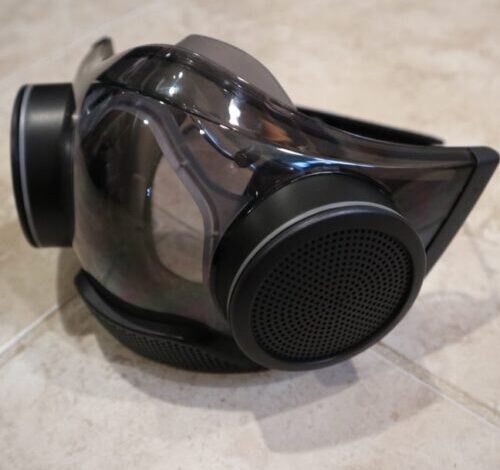Buyers of Razer’s bogus “N95” Zephyr masks get over $1 million in refunds

$1 million total sent to 6,764 consumers due to Razer settlement with FTC.
The Razer Zephyr mask.
Credit:
Sam Machkovech
The Federal Trade Commission said yesterday it is sending over $1 million in refunds to 6,764 consumers who purchased Razer Zephyr masks that were deceptively marketed as providing N95 protection during the COVID-19 pandemic.
The FTC sued Razer in April 2024, and the gaming-hardware company agreed to a settlement, including a $100,000 fine and $1,071,254.33 toward a fund for consumer relief. The payments are being distributed to mask buyers imminently, the FTC announced yesterday.
“The FTC is sending checks and PayPal payments to 6,764 consumers who purchased the deceptively marketed products. Recipients will get a full refund,” the agency said. “Consumers should cash their check within 90 days, as indicated on the check, or redeem their PayPal payment within 30 days.”
Trying to ward off scams related to the settlement, the FTC noted that it “never requires people to pay money or provide account information to get a refund.” Consumers with questions can “contact the refund administrator, Simpluris, at 1-833-285-3003 or visit the FTC’s website to view frequently asked questions about the refund process.”
Razer sold the $100 Zephyr mask for only a few months ending in January 2022 and continued to sell replacement filters until July 2022. Our November 2021 review said “the mask’s lack of usability in everyday life screams ‘first-generation product,'” and criticized the features, weight distribution, and fit. The mask had built-in fans and RGB lighting.
The Razer Zephyr standard version costing $100 came with the mask and three sets of filters that were said to last three days each. For $150, users got the mask and 33 sets of filters. Users could separately pay $30 for 10 sets of filters.
FTC: Razer knew mask wasn’t N95
The FTC alleged that Razer “falsely advertised its Zephyr masks as N95 or N95-equivalent,” saying that “the company never even submitted the masks for testing to the FDA or the National Institute for Occupational Safety and Health, and the masks were never certified as N95.”
In 2021, Razer’s marketing said the mask used “replaceable N95 grade filters for maximum protection.” Razer’s website said the mask was “FDA-registered and lab-tested for 99 percent BFE [Bacteria Filtration Efficiency]” and “offers greater protection compared to standard disposable/cloth masks, and filters air both inhaled and exhaled to safeguard you and others around you.”
But the FTC’s lawsuit against Razer said the company “knew the Zephyr was not certified as N95 and did not provide an equivalent level of protection.” Tests conducted by a contractor hired by Razer showed that “the assembled device failed to perform to the N95 standard of 95 percent or greater PFE [Particulate Filtration Efficiency],” the lawsuit said. The mask’s best test results were 86.3 percent with the fans on, 83.2 percent with the fans off, “and frequently tested much lower.”
In November 2021, tech reviewer Naomi Wu “criticized the Zephyr’s build and fit and noted that the mask was not NIOSH [National Institute for Occupational Safety and Health]-approved and would almost certainly be unable to get NIOSH approval due to its fit issues,” the FTC lawsuit said. “She especially called out Defendants for using the phrase ‘N95-grade filters,’ deeming that ‘deceptive marketing,’ noting that ‘N95 is a certification for an entire mask—not a part of a mask,’ and observing that simply using the same filter material as an N95 mask in the Zephyr did not mean that the Zephyr could provide a level of protection equivalent to an N95 mask.”
Razer exec: “Our marketing is misleading”
A Razer executive raised concerns internally after Wu’s criticism, the FTC lawsuit said:
In internal discussions following Ms. Wu’s tweets, Razer, Inc.’s Director of Global Public Relations recognized that Defendants’ claims were potentially misleading. In a January 8, 2022 email, he stated that “the ‘N95 grade filter’ wording that we’re using […] suggests that Zephyr is on par with officially certified N95 masks,” and asked “Do we have any certifications to back the N95-grade claim? Are we currently in the process of being officially certified/listed as a N95-grade product? Any other data that supports our marketing? The website can be confusing to read for customers, so can we boil it down to one clear statement (2-3 sentences max) on HOW Zephyr provides N95 grade protection?” He concluded: “And if we can’t do that, I’d recommend to stop using any ‘N95 grade’ claims in our marketing immediately.”
When another Razer employee responded that the filters were tested, Razer, Inc.’s Director of Global Public Relations reframed the question to whether “the Zephyr as a whole (not only the filters)” could claim to be N95-grade. “From a consumer and media POV, the key question here is: Does Zephyr offer the same protection as an N95 face mask? If it does, how can we prove that? And if it doesn’t, our marketing is misleading.”
Razer provided Ars a statement after the settlement was reached last year, saying that it “was never our intention to mislead anyone, and we chose to settle this matter to avoid the distraction and disruption of litigation and continue our focus on creating great products for gamers.”
“The Razer Zephyr was conceived to offer a different and innovative face covering option for the community,” the company said at the time. “The FTC’s claims against Razer concerned limited portions of some of the statements relating to the Zephyr. More than two years ago, Razer proactively notified customers that the Zephyr was not a N95 mask, stopped sales, and refunded customers.”
FTC: Only 6 percent of US purchases were refunded
The FTC lawsuit casts doubt on the earlier availability of refunds, saying that Razer “allegedly implemented” a refund policy. Razer provided refunds for less than 6 percent of Zephyr purchases in the US, the FTC said.
“While Defendants purport to have instituted a policy of fully refunding consumers concerned about the filters on January 9, 2022, Defendants did not promote that policy in its January emails to consumers or on its website,” the FTC said.
That’s a reference to a Razer email sent to mask buyers acknowledging that the mask “is not a medical device nor certified as an N95 mask.” The FTC said the Razer email to consumers “did not invite or otherwise indicate that consumers who believed they were purchasing an N95 mask when they purchased the Zephyr could request a refund from Razer.”
Razer customers who sought refunds ran into several kinds of problems, the FTC said. Some “were told that they could not receive a refund because they were outside of Razer’s standard 14-day return policy,” while others “were told that they could not receive a full refund because they had used the disposable filters provided with the Zephyr when they bought the Zephyr in October 2022 or because the Zephyr was no longer sealed and unused,” the lawsuit said.
“Numerous customers were deterred from, or confused regarding their ability to, obtain full refunds because of statements by Defendants’ customer service representatives that they were ineligible for full refunds,” the lawsuit said.
We contacted Razer today and will update this article if it provides further comment.
Jon is a Senior IT Reporter for Ars Technica. He covers the telecom industry, Federal Communications Commission rulemakings, broadband consumer affairs, court cases, and government regulation of the tech industry.




